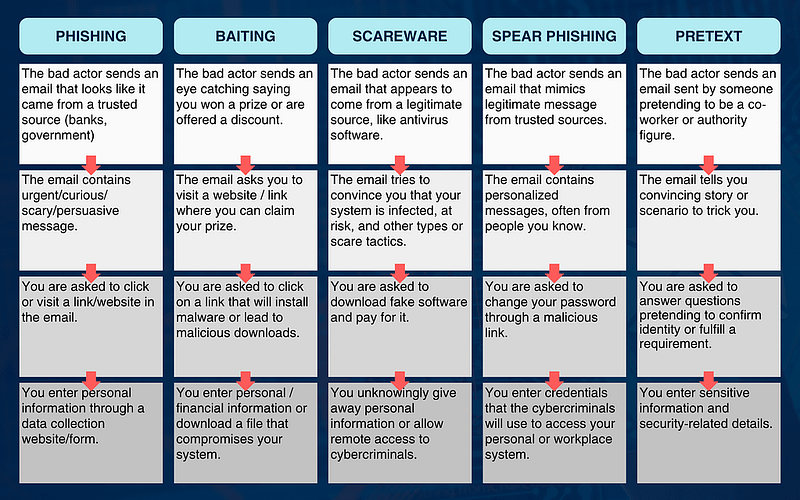Image Phishing Attacks: How Are They Bypassing Spam Filters?
My sister’s story started with a very enticing email subject and a seemingly irresistible offer. The email appeared to be from Kogan, an online store where she had made a few gadget purchases in the past. The reward promised is a Ninja Air Fryer in exchange for joining the loyalty program. A lot of people receive emails like the one Emily received. You may come across email scams pretending to be from Amazon, Kohl’s, or Dick’s Sporting Goods. Read more about it here.
How safe is your personal email? The surprising truth you need to know!

Hackers capitalize on people’s lack of awareness to deceive and exploit them. The internet is a gold mine for these hackers, who are always on the lookout for opportunities to exploit it. The scary part is that these attacks often rely on manipulating people, and that’s why they’re called “social engineering attacks.”
Fighting The Grandparent Scam: Protecting Our Loved Ones From Online Fraud

Statistics reveal that Americans lost over $10 billion last year to online scams and digital fraud, surpassing the occurrence of physical break-ins. And it’s seniors that lose the most money to these scams. Scammers use tactics like the “grandparent scam” to target seniors, pretending to be a family members in need of financial help.
Xfinity Mobile Scams: Don’t Fall for These Phishing Attempts

Take a look at this real example of a Detroit man who used Google search to find Xfinity online and ended up clicking on an ad that was meant to look similar to Xfinity’s website, only with a slight misspelling.
Are hackers targeting your personal email? Here’s how to defend yourself!

Hackers steal your personal information for malicious purposes such as theft. One of their methods involves utilizing social media and dark web forums to gather information about you. Shockingly, they can also acquire data from seemingly harmless sites such as surveys and online games.
Don’t Wait Until It’s Too Late—Take These Steps to Secure Your Personal Email Today!

Phishing scams, in particular, have become a prevalent threat in the email space. Surprisingly, statistics reveal that while users typically only open 3% of their spam emails, a staggering 70% of them open and read their phishing emails (FireEye). It’s alarming to think about how effective these criminals are at catching people’s attention. So, what tactics are these cyber criminals using to lure in unsuspecting victims? It’s a question worth pondering as we strive to protect our personal email accounts from potential cyber-attacks.
The One Mistake You’re Making With Your Personal Email Security – and How to Fix It!

An elderly retiree, received an email that appeared to be from her bank, asking her to update her account information urgently. The email included a link that directed her to a website that looked identical to her bank’s website. Without suspecting anything, they entered her login credentials and personal information.
Days later, they discovered several unauthorized transactions that had been made from her bank account. This type of scenario is all too common, especially among the elderly and those who are less familiar with technology.
Don’t Wait Until It’s Too Late—Take These Steps to Secure Your Personal Email Today!

Phishing scams, in particular, have become a prevalent threat in the email space. Surprisingly, statistics reveal that while users typically only open 3% of their spam emails, a staggering 70% of them open and read their phishing emails (FireEye). It’s alarming to think about how effective these criminals are at catching people’s attention. So, what tactics are these cyber criminals using to lure in unsuspecting victims? It’s a question worth pondering as we strive to protect our personal email accounts from potential cyber-attacks.
Is your personal email at risk? Find out how to protect it now!

Phishing scams, in particular, have become a prevalent threat in the email space. Surprisingly, statistics reveal that while users typically only open 3% of their spam emails, a staggering 70% of them open and read their phishing emails (FireEye). It’s alarming to think about how effective these criminals are at catching people’s attention. So, what tactics are these cyber criminals using to lure in unsuspecting victims? It’s a question worth pondering as we strive to protect our personal email accounts from potential cyber-attacks.
Protect Yourself from Identity Theft: Common Scams Used by Thieves

Identity theft is a serious issue that can have significant consequences. Fraudsters can steal your personal information to commit fraudulent activities that can harm your credit score. It can be a real nightmare and can take a lot of time and money to sort out.
